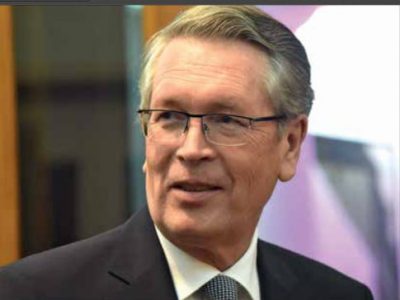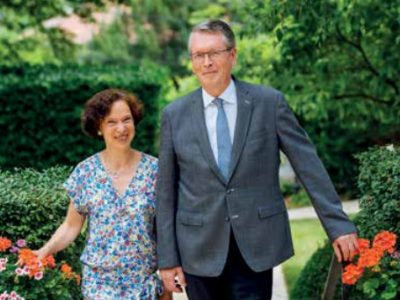There are just a handful of countries in the world, which, like Russia and Serbia, have been supporting each other and showing understanding for each other for centuries

The Russian Ambassador to Serbia, H.E. Alexander Chepurin will soon be leaving his post in which he spent seven years. In his farewell interview, the Ambassador talks about his plans for writing a book about our country, the Serbs, the relations between our two brotherly nations and things he will remember about Serbia.
You were appointed Russian ambassador to Serbia in 2012. Could you tell us what will you remember the most from your stay in Serbia?
— To be the Russian Ambassador in Serbia for seven years is a responsible, noble and thankful job. It was an educational one too. I will remember Serbia as a persevering, courageous, patient, kind-hearted, and affectionate country, the Serbs as bold, sincere, incredibly amiable people who, as soon as they hear the Russian accent, always smile brightly at the person they are talking to. There are many reasons for such a warm relationship between our two nations, among them a great cultural similarity, history, religion, and language. There is also the unity we showed in the most difficult moments. A friend in need is a friend indeed, as they say. The Serbs remember this and they regard it with reverence. That is precious.Another thing that I will remember is this special Serbian quality that is attached to everything around you – you hear Serbian music wherever you go, taverns are more successful than restaurants with foreign cuisine, there is no celebration without guests dancing kolo and singing the amazing song “Tamo Daleko” which is, by the way, well-known and loved in Russia too. The Serbs honour tradition. Serbian slava, which is one of the most eagerly anticipated and joyous holidays, reflects the unity among family and friends that is nurtured. This is one of the attributes of the nation, its stability and eternity, if you will. Of course, I have to mention the tangible changes in the country during the last seven years. The economic growth became sustainable, and it now ranges between 3% and 4% per annum. There are fewer unemployed people and more cars in the streets. Hopelessness is gone. Belgrade is becoming more beautiful. It is important that, regardless of the decades of drama that the Serbian people went through, they did not lose their national self-esteem and the belief in traditional guidelines. I would also like to note that, in recent years, there has been a noticeable rise in self-awareness in Serbs, a rise in a positive national self-consciousness. Serbia has begun to more energetically determine its own interests and the directions of its own development. Surely, I will always remember the people whom I was fortunate to meet in my capacity as ambassador. We developed warm and friendly relations with many of them. In addition, some of my fond memories are related to the 180th anniversary of the establishment of the diplomatic relations between our two countries, which we celebrated together last year, and to the official visits of President Vladimir Putin to Belgrade in 2014 and 2019. There are also many other Embassy-related events. It is impossible to mention them all here.We can often hear people calling the Serbs and the Russians “brothers”. You had a chance to meet our people.
How similar are Serbs and Russians in mentality?
— There are just a handful of countries in the world, which, like Russia and Serbia, have been supporting each other and showing understanding for each other for centuries. The Serbs, as well as the Russians, have “the Slavic soul”, which was written about by Dostoevsky, Bunin, Kuprin, and many French and Italian writers and poets. This Slavic soul means the opposite of rationality and ordinariness, the willingness to self-sacrifice, the ability to perceive someone else’s sorrows as your own; sobornost (in Russian – togetherness in a spiritual sense). The Serbs, as well as the Russians, are sincere, open, and generous. In Serbia, you are always received as a dear guest. By the way, in the Serbian language, the word domaćin (“host”) is not only a word, but alsoa philosophy.We are united by the loyalty to the ideals of freedom, the highest justice, the readiness to bear responsibility for the destiny of our countries and to safeguard the right to our own way of life. The Serbs, as well as the Russians, know how to stay calm in anything but simple circumstances. Probably, that is why the Serbs and we are always on the same side. There is a trait that is originally Serbian and innate to their national character, and that’s inat (“spite”). This is more than just “stubbornness”. This is the quintessence of the uncompromising commitment to principle. In a sense, inat aims at a status of a national idea. Another difference is the talent inherent in the Serbs to effortlessly combine Balkan vitality and expressiveness with the traditional polako (“languidness”). Polako, do not rush, things will straighten out, everything will be fine in the end. In Serbia, you never doubt that.
You are preparing a book about our country and people. What made you do that and what inspired you the most to write it?
— Recently, an old friend of mine and I remembered a rule – some-one spends two to three days in a country and they are ready to write a book, after a month or two they are ready to write an article, and after three years they understand they still do not know the country well enough, so they need to observe more. It is too early. Since I have been here for almost seven years, I decided I might as well try to write one. In Serbia, everything inspires. It is a land of wonderful people, beautiful landscapes, a distinctive culture, a great history and a bright future. Life here is an experience I want to share both with the Russians and with the Serbs. To convey my impressions, the way I feel Serbia.
You have travelled all over Serbia. Which parts of the country, not counting Belgrade, left the deepest impression on you?
— My wife and I are very fond of Novi Sad, the second largest city in Serbia, where the cultural treasures of the country are concentrated. By the way, this is one of the capitals of the Russian postrevolutionary emigration, including the religious emigration. We toured monasteries, especially in Fruška Gora, the so-called Serbian Athos, dozens of times, always with great interest. It is a place of scenic beauty. But I also have to say a few words about the Serbian capital city, Belgrade. I like it a lot. It is monumental, respectable, and comfortable at the same time. It has its own face and its own tradition. It has a soul. The city’s architecture is unusual and paradoxical – there are both grand buildings and tiny houses that have not changed locations and appearances for hundreds of years. Lots of greenery and sunshine, the picturesque view of the Danube and the Sava, and most importantly, 1.5 million of amiable people – that is the treasure of the Serbian capital city. During your term as the ambassador, President Putin visited Serbia on several occasions.
How would you rate the relations between our two countries and how can we improve them?
— Our strategic partnership with Serbia is based on trust and mutual respect, common priorities regarding the socio-economic development, similar approaches to the development of interstate communication and the maintenance of international peace and security. The leaders of our countries meet on a regular basis. We have supported and will continue to support Belgrade in protecting national interests, sovereignty and territorial integrity of Serbia in accordance with the norms of international law, primarily the UN Security Council Resolution 1244. We highly appreciate the independent foreign policy exercised by the Serbian leadership and the preservation of military neutrality. Our military-technical cooperation is an important component of bilateral relations. There are many positive developments in the economic sphere too. In 2018, the external trade between our two countries amounted to USD 3.06 billion, which is an 18.6% increase compared to 2017. That means we are heading the right way. Russia is in particular interested in increasing import from Serbia. Serbia’s economic growth allows us to look forward to it. Among the significant bilateral projects, I would like to mention the reconstruction of the Serbian railway system, modernization of the underground gas storage Banatski Dvor, construction of the Bulgar-ia-Serbia-Hungary main gas pipeline and the rehabilitation of the Djerdap hydroelectric power plant. We plan to strengthen industrial cooperation through joint production. Another important area of cooperation is the sphere of digitization and innovation, including the sphere of peaceful nuclear technology. Much has already been done in the field of crisis management by the Russian-Serbian Humanitarian Centre in the city of Niš. Together with the Serbian partners, we plan to further develop the Centre, with special attention given to the regional dimension of its activities. A number of wonderful cultural and humanitarian projects are being implemented too. The best illustration is the decoration of the interior of the Church of Saint Sava in Belgrade, which is the largest Orthodox temple in the Balkans. The Church will become an important symbol of the indissoluble spiritual unity of our peoples. Our relationship stood the test of time, hence the confidence that we can accomplish a lot. Further deepening and expansion of the Russian-Serbian ties are fully in line with the natural and objective interests of our countries.
Are you going to continue your diplomatic career in another country or are you definitely returning to Russia?
— I have a couple of very good job offers in Moscow. I will choose what interests me the most.